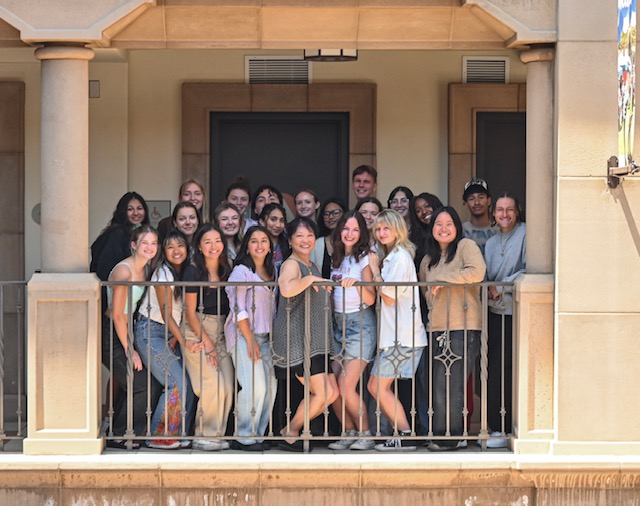ABIGAIL CAVIZO / ASSOCIATE EDITOR
Last semester, Torero Program Board (TPB) Chair Marco Jimenez stepped down from his position of leadership. TPB is a branch of USD’s Associated Student Government (ASG), primarily focused on planning events and programs for the undergraduate students throughout the school year. Previously, Jimenez was involved with TPB for two semesters as the Marketing Coordinator, then transitioned to TPB Chair for one semester. As the lead of TPB, the chair also holds a seat on ASG’s executive board.
Jimenez expressed how being a part of ASG’s executive board ultimately led to his decision to leave.
“The reason I chose to leave was because I felt that the ASG organization was run in an unfair way. It’s supposed to be ‘by the students, for the students’ – that’s the whole slogan. But I felt that there was unnecessary and unjust intervention from the advisors who were meant to support the org, but a lot of the times, it felt like they made the decisions for us and didn’t give us the option,” Jimenez said.
Jimenez gave insight into explaining ASG’s processes, including how ASG decides the budget, student autonomy within the organization and impact on the student body.
Every undergraduate student at USD pays $260 in their tuition toward a “student activity fee” for the 2023-2024 school year, with 30% going to TPB. ASG disperses the money among many different centers on campus, such as United Front Multicultural Commons (UFMC), the Black Student Resource Commons (BSRC) and the Mulvaney Center. These centers that request money have other clubs underneath them.
For example, UFMC requested $21,030 for the Spring 2024 semester and $13,235 was approved. The approved amount is put toward events hosted by UFMC, such as “DiversiTea,” a monthly dialogue series discussing relevant current events and socio-political issues. Throughout the semester, other clubs can request money through the ASG budget committee, which meets every Tuesday during dead hours. ASG and TPB run their organizations on the slogan “by the students, for the students,” meaning that all student money needs to go back to the student body, whether that be through events, clubs or programs.
Jimenez explained the budgeting processes for the student activities fee.
“Every quarter, the ASG finance committee meets to allocate the budget. That consists of the ASG President, the Finance chair, the [ASG] Vice President, the Speaker of the Senate, the four Senate Committee Chairs and me — the TPB chair. The Finance Chair doesn’t vote. He just facilitates the meeting,” Jimenez said.
“TPB alone last semester [Fall 2023] had $312,000 to use across 12 events. ASG as a whole has $1.6 million to distribute [for the 2023-24 school year]. This includes revenue and the money that rolled over. If the money isn’t used the whole year, it rolls over to the next.”
ASG members, including the TPB chair, are compensated for their work through work service awards (WSA). Calculated by the Office of Financial Aid, WSA for members of ASG are determined through a review of their job descriptions and corresponding number of work hours. The Office of Financial Aid reviews these independently, and then determines the amount that student leaders are awarded. Members of ASG do not have a formal say in this. The TPB Chair position receives $2,900 per semester.
ASG also makes decisions, working with their four, full-time advisors, one of whom is Assistant Director of Student Activities and Involvement. This position, along with the Executive Assistant for Student Activities Involvement, are two of the staff members that are salaried through the student activities fee. The executive assistant works with scheduling across the organization and also takes care of payments and checks, while the assistant director manages the finances.
Jimenez explained that the main reason why he left the organization was because of the perceived power imbalance between the ASG advisors and the student WSA members of ASG.
“The person who previously held the [assistant director] position left, and that needed to be rehired, but that decision was not in the hands of the students. You would think that the decision should be made by ASG exec, or by the students because we’re the ones paying for the salary [through the student activities fee], but that decision is made by USD staff — the advisors,” Jimenez said. “Another power imbalance is that we had to cater to their schedules, and weren’t allowed to meet outside of working hours [9 a.m. to 5 p.m.] for our ASG exec meetings, even though we’re full-time students, and there were much better times, where all of our schedules aligned.”
The Public Relations Chair for ASG, Morgan Pheng, responded on behalf of ASG in an email to The USD Vista to explain the role that the Executive Assistant and Assistant Director play in the organization.
“As ASG Members, we are an integral part of the interview process for the Executive Assistant of ASG and the Assistant Director of ASG and play an active role in the hiring process. These staff members play a crucial role in supporting student-led initiatives, advocating for student interests, enhancing student engagement, and providing resources to student organizations and ASG members. Both the Executive Assistant of ASG and Assistant Director of ASG have tasks that are deeply integral to the day to day activities of students and support ASG leaders in executing our decisions.”
The students in ASG are meant to represent the student body, but Jimenez asserted that he thought the advisors would make decisions that didn’t always represent the students.
“There were occasions when I felt pressured into making decisions from the advisors that I didn’t think were best or most fair for the students and for my team,” Jimenez stated. “For example, TPB does merch giveaways, and I would be strongly advised to not give merch to the entire team, but only to those who were on the committee. The team wouldn’t be allowed to have any [merch] because they had class during the actual giveaway, even though it’s worked on together. But then, the advisors would take an extra pair for themselves. If you walk into the office, there are piles of unused merch that sit there, [which] could [instead] be in the hands of a student who paid for it with our student activities fee.”
Spending the students’ money wisely was a consistent reminder for ASG members from the advisors, but Jimenez thought that the advisors did not always follow their own advice.
“Students’ money was never misused in any major ways, but there are things I disagree with about how money is allocated,” Jimenez said. “For example, in the senate, all the food is paid for there using different ASG budgets. And something that was stressed on me as TPB chair was that the money needed to be used wisely. If that’s such a big stressor, why are they able to have so much food at the senate? It gets taken back to the ASG office.”
Jimenez explained that he wasn’t alone in the conversation. Before he left, members of the ASG executive team met outside of working hours to discuss the leadership dynamics within ASG.
“In my experience with ASG exec and TPB, we would talk about it a lot. I can guarantee that every single person between those two groups feels this exact same way, even if they don’t speak out about it,” Jimenez said.
On behalf of ASG, Pheng also sent the following statement in an email to The USD Vista:
“ASG is an excellent opportunity for students to build their leadership and decision making skills autonomously, while still having the support structures and guidance of staff. ASG Advisors play a supportive and advisory role in student government decision-making processes, whereas ASG members hold formal positions and voting powers that directly influence decisions impacting the student body. ASG members are responsible for soliciting input from their constituents, representing their interests, and making decisions that reflect the needs and priorities of the student body.”
Jimenez emphasized that since it is the students’ money in the activities fee, students should know about their opportunity to speak up about anything at ASG Senate meetings, which occur every Thursday during dead hours.
“Outside of it now, I know that ASG members work hard — even with the unspoken power imbalance in the way that the students [ASG members] don’t have as much autonomy over the organization,” Jimenez said. “I would describe being the TPB Chair as a ‘thankless position.’ I left the organization with nothing but the friendships made, and I hope it changes for them and for the USD community.”
USD students pay a $260 ‘student activity fee’ per year which is given to ASG to allocate to different centers on campus. @usdasg3664/YouTube





Leave a comment